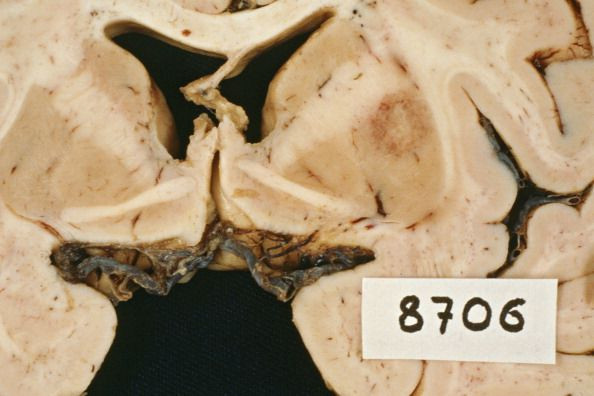Road Rage Infection: Intermittent Explosive Disorder May Be Caused By Toxoplasmosis Gondii Parasite In The Human Brain

Millions of people suffer from rage disorder, a psychiatric condition marked by explosive episodes of unwarranted anger. But a team of researchers from the University of Chicago have discovered it really might not be their fault; there’s a good chance a parasite living in their brains is causing their abnormal bouts of rage.
Roughly 30 percent of the human population is walking around with one of these parasites in their brains, and many don't know. According to the new study, published in the Journal of Clinical Psychiatry, people suffering from intermittent explosive disorder (IED) are twice as likely to be infected carriers. The single-celled parasite Toxoplasma gondii spends most of its life cycle inside a cat, but can infect people when they touch their mouths after changing their cat’s litter. The parasites are also transmitted through undercooked meat or contaminated water and usually reside as a harmless, latent infection.
"This is definitely not a sign that people should get rid of their cats," said study co-author Dr. Royce Lee, associate professor of psychiatry and behavioral neuroscience at the University of Chicago, in a press release. "We don't yet understand the mechanisms involved -- it could be an increased inflammatory response, direct brain modulation by the parasite, or even reverse causation where aggressive individuals tend to have more cats or eat more undercooked meat.”
For the study, researchers recruited 358 participants who were then evaluated for IED, personality disorder, depression, and other psychiatric disorders. Each participant was measured for characteristic traits, including anger, aggression, and impulsivity and then later tested for a latent toxoplasmosis infection. One third of the subjects were diagnosed with IED while another third were diagnosed with a psychiatric disorder other than IED. The last third had no adverse behaviors or notable diagnoses and served as a control.
It turns out, the group diagnosed with IED was twice as likely to test positive for a toxoplasmosis infection compared to only nine percent of the participants in the healthy control group. Twenty-two percent of those who had the characteristic anger disorder were infected by the parasite, while 16 percent of those with another psychiatric disorder were infected. But across the board, all of the participants whose blood tested positive for a toxoplasmosis infection scored significantly higher on scores of anger and aggression, whether or not they were healthy, diagnosed with IED, or another psychiatric disorder. Researchers aren’t sure if the parasite is directly causing aggression or IED, or if the two are simply correlated.
Or, maybe the parasite is driving some sort of abnormal behavior in humans that researchers haven’t pinpointed. When the parasite infects rats, for example, it brainwashes the rat to become attracted to cat urine, instead of being instinctively repelled by it. Cats are, after all, rats’ natural predators. The parasite wants to return to the feline’s gut, the environment it needs in order to reproduce and thrive. Is a similar phenomenon occurring inside the brains of humans? Do the parasites have some ulterior motive we haven’t yet uncovered?
“We don't know for sure what Toxoplasma gondii does to the brain, though there is a small body of work showing that it might be directly manipulating the chemistry of individual neurons,” Patrick House, a neuroscientist at Stanford University who did his graduate work on Toxoplasma gondii ’s effect on the brain, told Medical Daily. “Depending on the brain region, it's not implausible that such changes could alter aggressive tendencies in the host.”

Treating Parasites In The Brain
House warns that a toxoplasmosis infection can be extremely dangerous and even fatal to unborn babies or to those with weak immune systems. In 90 percent of cases, the infection has no symptoms, but in other cases, the parasite has caused painless swelling of the lymph nodes, headache, general feeling of sickness, fatigue, and low-grade fever. Will anger soon be added to the list? Without a cure, those who experience symptoms may have no way to get rid of them.
"Latent infection with the toxoplasma gondii parasite may change brain chemistry in a fashion that increases the risk of aggressive behavior," said the study’s senior author Dr. Emil Coccaro, the chair of psychiatry and behavioral neuroscience at the University of Chicago, in a statement. "It will take experimental studies to see if treating a latent toxoplasmosis infection with medication reduces aggressiveness.”
For women who are infected, living with symptomatic anger can be particularly dangerous to their wellbeing. In two different studies, published in JAMA Psychiatry, researchers found mothers who were infected with Toxoplasma gondii were at an increased risk of self-harm and violent suicide attempts. When researchers came across the link between the parasitic brain infection and self-directed violence, they could only speculate the possible neurological mechanisms at play. They were especially interested in discovering how a person’s behavior may change depending upon the region of the brain the parasite inhabits. In the case of anger, perhaps the parasite lived in a region that triggered emotional reactions in its human host.
“Once Toxoplasma gets into the host, there is no known way to clear it,” House said. “Drugs can manage the infection if it was recently acquired, but once it gets into the central nervous system it is very difficult to get out. Not many pathogens make it into the brain without killing the host, so our tools for treating brain-based, pathogenic disease are rather limited at the moment.”
Source: Coccaro E, Lee R, Groer MW, Can A, Coussons-Read M, and Postolache TT. Toxoplasma gondii Infection: Relationship With Aggression in Psychiatric Subjects. The Journal of Clinical Psychiatry . 2016.
Published by Medicaldaily.com



























